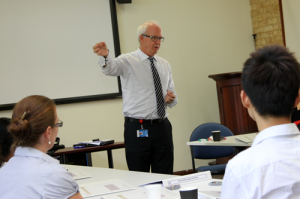“We must get the message out that palliative care is about living, not dying. Because if you are dying, you must be alive!” said Professor Rod MacLeod. 
It’s a message he is keen to speak about during Palliative Care Week, this week from May 19-25. The theme is ‘Palliative Care – Everybody’s Business.’ And MacLeod is in a good position to know, as one of Australia’s most experienced palliative care specialists. He leads HammondCare’s Palliative Care Education and Research Centre, as well as being Conjoint Professor of Sydney University.
MacLeod said that palliative care, since its inception in 1967, has always been about every aspect of the patient.
“Palliative care has, for 50 years, provided physical, psycho-social and spiritual care and of these, caring for physical symptoms is the most straightforward. The area we find most challenging, and are seeking to learn more about, is how to care for the spiritual needs of people.
“For the person facing their last days, spirituality becomes huge. It can be easier to support people in this area if they have religion, because we have an understanding of what religion means to people.”
“But a lot of Australians don’t have religion,” he added, “So we need to get to know each patient so we can develop an understanding of what gives their life meaning.”
Part of this meaning is in helping people come to terms with suffering. But sometimes this suffering is not as apparent as it seems.
“A patient was referred to me with terribly painful arthritis such that you could hear his joints crunching … and on top of it all, he had developed a painful form of bone cancer. I asked him if he was suffering, and to tell me about it, which may seem a silly question. But he said, ‘Yes, I am suffering, and my suffering is this: My daughter went surfing on Boxing Day six years ago and never came back. That’s my suffering.’”
As part of his work, MacLeod has seen first-hand how people’s priorities change in the face of death. Family and spiritual issues can become very important. He is currently involved in research into the spiritual distress of people in palliative care.
“People need to feel safe, they need to feel secure. People need to have a sense of belonging,” MacLeod said.
“Part of the difficulty at the end of a person’s life is that they feel they are a burden on their family, a burden on society. And that’s the scary thing about euthanasia – that you can feel you want to be dead because you don’t want your family to be looking after you.”
Palliative Care Week is from May 19-25. For more on Palliative Care in Australia, see www.palliativecare.org.au.
Email This Story
Why not send this to a friend?
